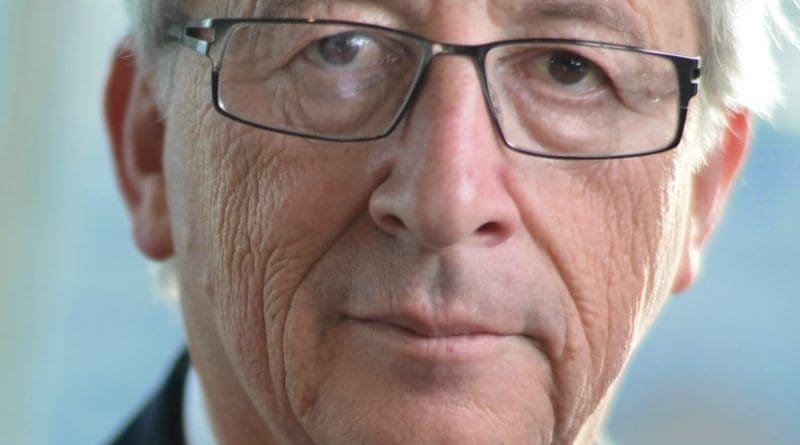EU’s ‘Game Of Thrones’ Begins After Voters’ Mixed Message – OpEd
By Arab News
By Andrew Hammond*
European presidents and prime ministers began their own “game of thrones” on Tuesday as they prepared to fill key EU positions that will shape the bloc’s political agenda well into the 2020s. Up for grabs are top jobs including the European Central Bank chief and European Commission president, but the wrangling has been complicated by Sunday’s European Parliament election results, which created a more fragmented political landscape.
Take the example of the European Commission president role, which is widely seen as the most important in Brussels. While the post was discussed by national leaders at Tuesday’s summit, it is the Parliament that may now have significant opportunity to influence the choice of successor to Jean-Claude Juncker in the coming weeks.
Thanks to an agreement forged before the 2014 European elections, Juncker was nominated by the voter bloc that secured the most seats. While national governments have ultimate power over the appointment, the legislature’s voice was louder than ever on the important decision to select the former head of the right-of-center European People’s Party (EPP), who has held the post for the last half-decade.
Yet Sunday’s results from the biggest multi-country election in the world sent out a mixed message, which has clouded the picture. There were gains for anti-integration parties, but also centrist liberals and Greens too, resulting in a more fragmented legislative landscape.
As in 2014, the EPP finished first, albeit with a significantly reduced number of seats. While its candidate to replace Juncker — the German Manfred Weber — is now in a good position and is backed by Angela Merkel, his elevation is by no means a foregone conclusion. This is partly because several prominent European leaders, including France’s Emmanuel Macron, have indicated they are lukewarm or outright opposed to Weber’s appointment.
Weber’s prospects are also not helped by the fact that the EPP was one of the clear losers in the elections, alongside the center-left Progressive Alliance of Socialists and Democrats (S&D). These two powers, which have largely held sway in the Parliament since it became directly elected in 1979, lost their — collectively held — previous majority of European Parliament seats.
Take the example of Germany, where Chancellor Merkel’s center-right Christian Democrats (part of the EPP) got 28 percent of the vote — its worst-ever performance in European elections. Meanwhile, the center-left Social Democrats (part of S&D) also did poorly, coming third with 16 percent.
Meanwhile, Euroskeptic parties made clear gains in some countries. These included the extreme-right League in Italy, Fidesz in Hungary, and the UK’s Brexit Party. Yet, at the same time, the pro-EU Greens and centrist Alliance of Liberals and Democrats for Europe (ALDE) also won many seats, including with the addition of Macron’s En Marche to its group.
The weak result for EPP and S&D reflects the very clear disenchantment of millions of people with the status quo in Brussels. This has been driven by a wide range of factors, including disquiet with long-established national political parties and systems, concern over immigration, and anger over the post-2008 economic downturn and subsequent austerity measures.
Yet, despite this context and the high profile that Euroskeptics enjoyed in this year’s elections, there will be disappointment among anti-integrationists that they did not secure greater gains. Part of the reason for this was the marshaling of centrist, liberal forces, including by the strongly pro-EU Macron, who depicted the contest as a choice for or against Europe.
These same parties also sought to capitalize on the fact that Eurobarometer surveys last year found that more people than ever consider their country’s membership of the EU to be a good thing (62 percent). This was the highest figure in a quarter of a decade, with 68 percent of people believing that their nation has benefited from EU membership.
Another striking element of the 2019 European elections was the relatively high average turnout of almost 51 percent among the 350 million-strong electorate. This 20-year-high comes in the context of previous major voter discontent and apathy in European ballots, which was fueled by the fact that the Parliament is generally not trusted by many Europeans, for whom Brussels seems very remote to their day-to-day lives.
Voter turnout, before 2019, was a picture of decline, slipping from 62 percent in 1979 to a record low of 42 percent in 2014. Indeed, in some countries, turnout only just got into the double digits five years ago. This apathy was apparent despite the steadily growing powers enjoyed by the European Parliament, which has a potential veto over annual EU budgets and the capability to amend or block a wide range of draft laws that are devised by the European Commission.
Taken overall, voters have delivered a mixed message that has fragmented the legislative landscape and may now make it significantly harder to carve up the top EU jobs. Nonetheless, the preponderance of power continues to be held by a moderate majority, despite gains by some Euroskeptic parties, with the bolstering of the center ground by the resurgent Greens and liberals.
- Andrew Hammond is an Associate at LSE IDEAS at the London School of Economics

